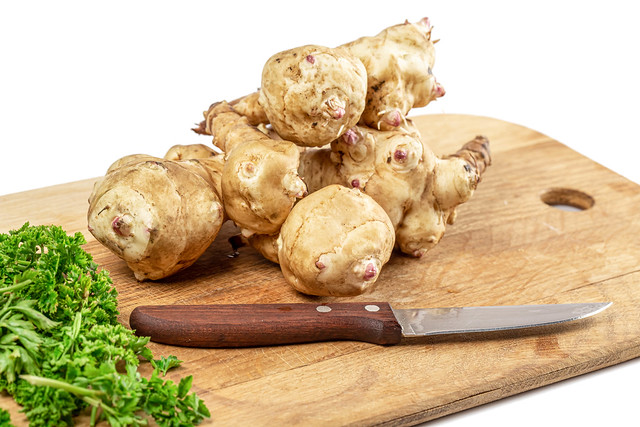Table of Contents
- Does Inulin help with weight loss?
- Is Inulin a good choice while on a Keto diet?
- What is the glycemic index of Inulin?
- Does Inulin break a fast?
- What is the benefit of combining Inulin and Chromium Picolinate?
- Want to know more?
- Sources
Does Inulin help with weight loss?
Inulin can help with weight loss because it reduces hunger leading to a decrease in food intake, and calorie consumption. Inulin can also help overweight and obese children to control their appetite resulting in reduced energy intake.
A study was performed on 44 prediabetic patients to evaluate the effectiveness of inulin for weight management and fat. The participants consumed inulin or a placebo for 18 weeks. Following the study, researchers noted a significant weight loss after 9 weeks in the patients taking inulin. The researchers also found a decrease in the intracellular lipid levels in the same group.
Another study found that consumption of inulin decreased free fatty acids as well as hunger hormones in the participants.
A study performed on 125 overweight participants revealed that inulin consumption improved appetite control.
Is Inulin a good choice while on a Keto diet?
Inulin is a good choice while on a keto diet since it contains very few calories. A keto diet entails consuming a very low amount of carbohydrates, and the consumption of fiber can be accommodated. Inulin is considered a plant fiber with a very low-calorie count and thus fits perfectly in the keto diet.
It offers several advantages for keto dieters:
- Sugar replacement: Inulin is a low-intensity sweetener and can be used to sweeten tea, coffee, and other beverages without adding any calories.
- Blood sugar: Studies show inulin can help manage blood glucose levels.
- Decreases hunger: Research on inulin shows that it can decrease the appetite-stimulating hormone and reduce food intake.
- Inulin works as a good source of plant fibers and a prebiotic.
In the video below, Nutritionist Rick explains how Inulin can be helpful for weight loss:
This is our recommended Probiotic Supplement with Inulin:

Biotics 8 – Probiotic Formula For Overall Gut Health
What is the glycemic index of Inulin?
The glycemic index of inulin is 1. The glycemic index can be defined as how quickly a specified amount of food can raise the blood sugar level. For reference, Maltodextrin has the highest glycemic index of 110, and the table sugar is at 65. While, all artificial sweeteners such as sucralose, stevia, and aspartame have a glycemic index of 0.
Low glycemic index foods are especially beneficial for diabetic people because they do not cause a rapid rise in blood sugar levels. They also do not contain or have a very low amount of calories. Low glycemic index sweeteners can be used to substitute sugar in daily use without worrying about elevation in blood sugar levels.
Does Inulin break a fast?
Inulin does break a fast given its stringent requirements.
- Intermittent fasting: It requires strict control over carbohydrate intake, and consuming carbs can break the fast. Since Inulin contains a small number of calories, about 5 per serving, consumption of inulin can break a fast. However, like other carbs inulin does not cause an insulin reaction.
- Religious fasting: If you are fasting for any religious reasons, consuming plant products that are not fruit should be avoided. Given inulin is derived from chicory root it can break the fast. Different religions follow different practices with fasting so it is better to make sure before you consume inulin.
What is the benefit of combining Inulin and Chromium Picolinate?
The combination of Inulin and chromium picolinate is mostly used in the case of chromium deficiency, to control blood sugar levels, lose weight and lower cholesterol levels. Inulin also helps control blood sugar levels and manage weight. Given these two have some similar actions are often used in combination.
Inulin chromium picolinate belongs to the class of laxatives and can help with constipation. The product can interact with several other supplements, vitamins, and drugs, hence consult your physician before consuming it.
Want to know more?
Click the links below to access the individual topic pages:
Sources
This article makes use of information from the U.S. National Library of Medicine under the terms of the Creative Commons Attribution 4.0 International License.
- Guess ND, Dornhorst A, Oliver N, Bell JD, Thomas EL, Frost GS. A randomized controlled trial: the effect of inulin on weight management and ectopic fat in subjects with prediabetes. Nutr Metab (Lond). 2015 Oct 24;12:36. doi: 10.1186/s12986-015-0033-2. PMID: 26500686; PMCID: PMC4619305.
- Tarini J, Wolever TM. The fermentable fibre inulin increases postprandial serum short-chain fatty acids and reduces free-fatty acids and ghrelin in healthy subjects. Appl Physiol Nutr Metab. 2010 Feb;35(1):9-16. doi: 10.1139/H09-119. PMID: 20130660.
- Reimer RA, Willis HJ, Tunnicliffe JM, Park H, Madsen KL, Soto-Vaca A. Inulin-type fructans and whey protein both modulate appetite but only fructans alter gut microbiota in adults with overweight/obesity: A randomized controlled trial. Mol Nutr Food Res. 2017 Nov;61(11). doi: 10.1002/mnfr.201700484. Epub 2017 Aug 29. PMID: 28730743.
- Hume MP, Nicolucci AC, Reimer RA. Prebiotic supplementation improves appetite control in children with overweight and obesity: a randomized controlled trial. Am J Clin Nutr. 2017 Apr;105(4):790-799. doi: 10.3945/ajcn.116.140947. Epub 2017 Feb 22. PMID: 28228425.
- Jackson KG, Taylor GR, Clohessy AM, Williams CM. The effect of the daily intake of inulin on fasting lipid, insulin and glucose concentrations in middle-aged men and women. Br J Nutr. 1999 Jul;82(1):23-30. doi: 10.1017/s0007114599001087. PMID: 10655953.


